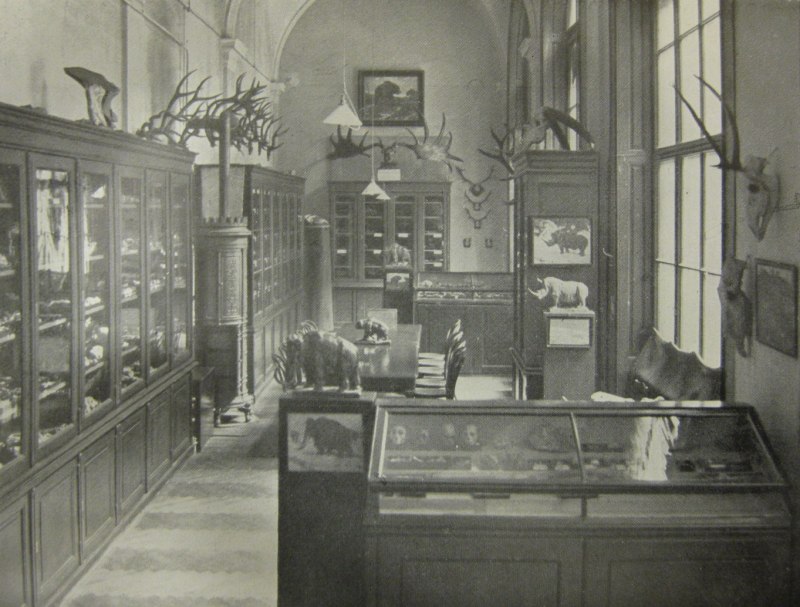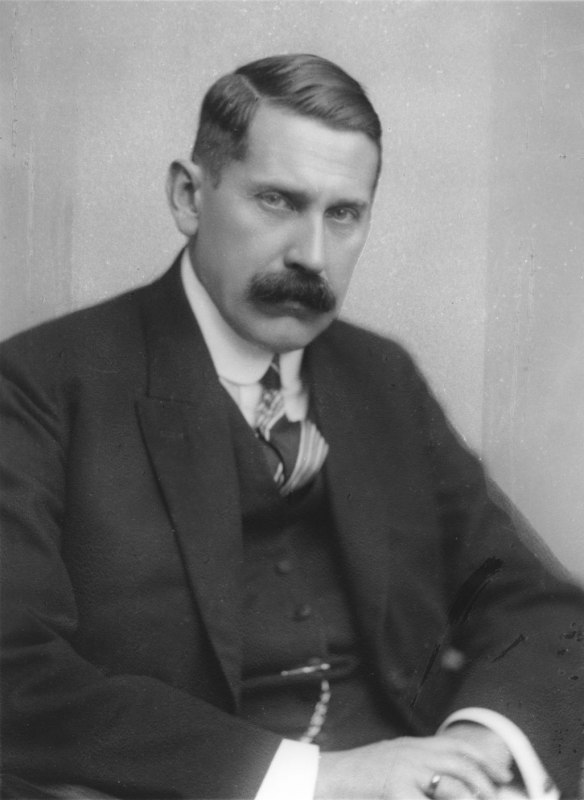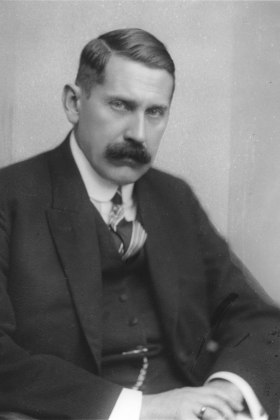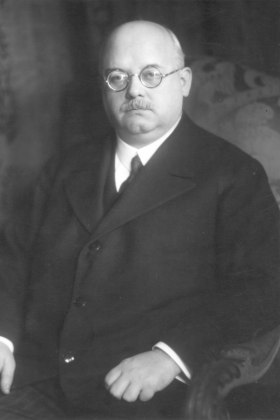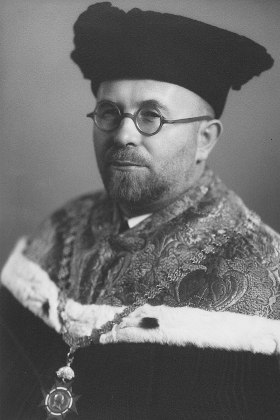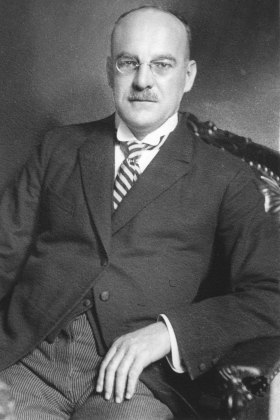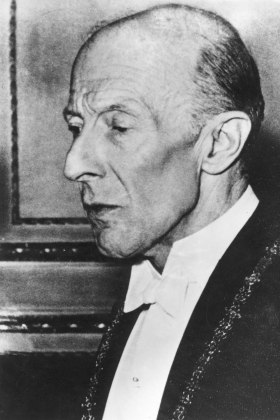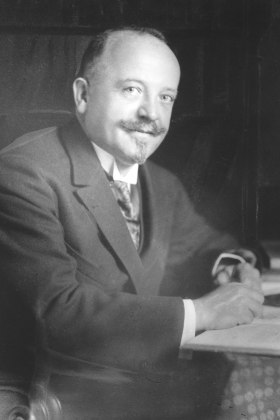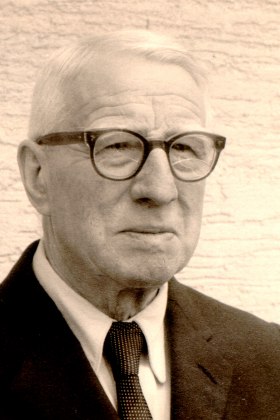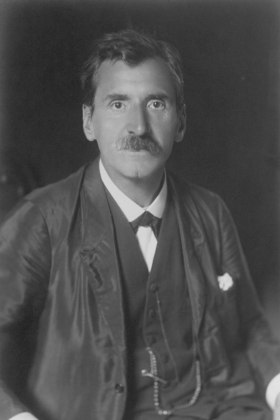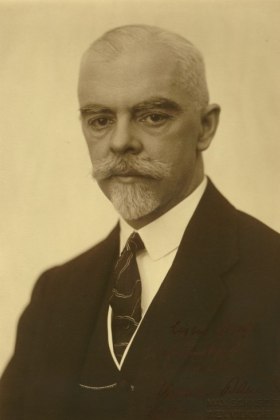The “Bärenhöhle” – a secret anti-Semitic group of professors in the inter-war period
After the First World War a numerus clausus for Jewish students and teachers was repeatedly demanded. Their number was supposed to be restricted to ten percent each. Since this contradicted the principle of equality established in the constitution, the anti-Semites had to find a different way to accomplish their goals. Among the teachers, this happened via networks such as the Spann-Circle (at the Faculty of Law and Political Science) or the covertly operating “Bärenhöhle” (“Bear Cave”) at the Philosophical Faculty. The intervention and collusion of these groups made it nearly impossible for Jewish or leftist scientists to be habilitated or appointed at the University of Vienna from the early 1920s onwards. Started by anti-Semitic paleontologist Othenio Abel, the Bärenhöhle counted several prominent humanities scholars who supported each other and partially remained influential after 1938 and 1945.
"I really take the credit for binding our anti-Semitic group together so closely that we form a strong phalanx. And while I have lost and still lose much time and energy, I hold on to the knowledge that this work is perhaps as important as making books.“
These words were written by renowned paleobiologist Othenio Abel in a letter to his friend, Father Leonhard Angerer, in early 1923. This passage is one of the few references to a covertly operating group of anti-Semitic university professors, presumably founded by Othenio Abel.
This influential secret network was comprised of about 18 professors of the Philosophical Faculty and worked under the code name “Bärenhöhle”, or B-H. The origin of this peculiar name was the location of the conspiratorial meetings, the paleontological seminar room (between staircases IX and VII in the university’s main building), where among other things Abel’s collection of cave bear bones from the Drachenhöhle (Dragon Cave) in Mixnitz, Styria, was housed.
Anti-Semites with influence
Members of the Bärenhöhle were mainly influential humanities scholars such as Richard Meister, Oswald Menghin or Heinrich Srbik, who – like Abel himself – all were Deans and rectors for a time. Both Srbik and Menghin even became Ministers of Education for a short period. These professors for example had themselves nominated into habilitation and appointment commissions as well as influencing other professor colleagues, and thus were able to successfully meddle in many personnel decisions.
Abel and his secret group presumably already played an important role in the election of the German-nationalist and anti-Semitic geologist Karl Diener to the position of rector in 1922. Diener was responsible for the erection of the „Siegfriedskopfs“ and among other things became known for the demand that “the reduction of Eastern Jews must take up a preeminent position in the program of every rector of a German university”.
Prevention of habilitations and appointments
The goal of the 18 members of the Bärenhöhle was to prevent Jewish and/or leftist researchers’ careers. This worked out, for example, in regard to the aspiring physicists Karl Horovitz and Otto Halpern, who, despite good professional qualifications, were not habilitated and thus already left Austria before 1927. In biology, thanks to Abel, among others the Jewish zoologist Leonore Brecher and her colleague Paul Weiss failed to achieve habilitation in 1926. They too emigrated.
At the humanities, the situation for Jewish researchers was at least as hopeless as in physics and biology, as the example of Edgar Zilsel shows. He already stopped applying for a venia legendi in philosophy in 1924, after two members of the Bärenhöhle had negatively reviewed his application papers. Due to the hopeless circumstances, many young academics (such as the philosopher Karl Popper or the physicist Marietta Blau) did not even try to apply for a teaching license in the late 1920s.
Mutual support
Thus, Abel and his colleagues saw to it long before 1938 that at least half a generation of Jewish and leftist scientists never had a chance of building an academic career at the Philosophical Faculty. Conversely, some of the professors who owed their appointments to the Bärenhöhle-network were accepted into the group and continuously supported, among them Wilhelm Czermak (professorship in 1925) or Robert Lach (professorship in 1927).
Until 1939 all members of the Bärenhöhle, except for the historian Gustav Turba who passed away early, became corresponding or full members of the Academy of Sciences – 16 out of 17 in the philosophic-historic class. In comparison, not a single humanities scholar or social scientist of Jewish descent active in Austria had been accepted into this class since 1919.
In 1934 some of the exposed National Socialists of this camarilla, such as Othenio Abel, Hans Uebersberger or Viktor Christian, lost their professorships for political reasons. Several of the remaining members managed to build careers after the “Anschluss” – among them Heinrich Srbik (president of the Academy of Sciences 1938-1945), Oswald Menghin (short-time Minister of Education 1938), or Viktor Christian (Dean and Prorector).
Aftermath after 1945
Other former members of the cartel had their time in the spotlight after 1945. Particularly Richard Meister helped make the de-Nazification process as mild as possible as Prorector, Rector (1948/49), and as vice president and in 1951 president of the Austrian Academy of Sciences. While some of his former network colleagues lost their professorships, they at least all were readmitted to the Academy of Sciences, which became a refuge for former academic National Socialists under Meister’s presidency in the 1950s.
After 1945, Meister and the others naturally had no interest in the return of emigrated scientists they had themselves driven out earlier. Part of the reason for the failed remigration presumably was the associations that reached back to the 1930s. For example, the Minister of Education from 1954 to 1964, Heinrich Drimmel (ÖVP), who had appointed several former National Socialists such as Taras Borodajkewycz, Otto Höfler, Heinz Kindermann or Richard Wolfram, was a declared student of Richard Meister and listened to his counsel in all important university matters.
Articles
- Anti-Semitism at the University of Vienna
- “Furor teutonicus and racial hate”
- Student corporations in the 19th and 20th century
- The “Bärenhöhle” – a secret anti-Semitic group of professors in the inter-war period
- The Gleispach’sche Studentenordnung (Gleispach Student Regulation)
- Terror against the Anatomical Institute of Julius Tandler
- Expulsion of teachers and students in 1938
- The de-Nazification of the professorate at the University of Vienna
Last edited: 03/13/24

